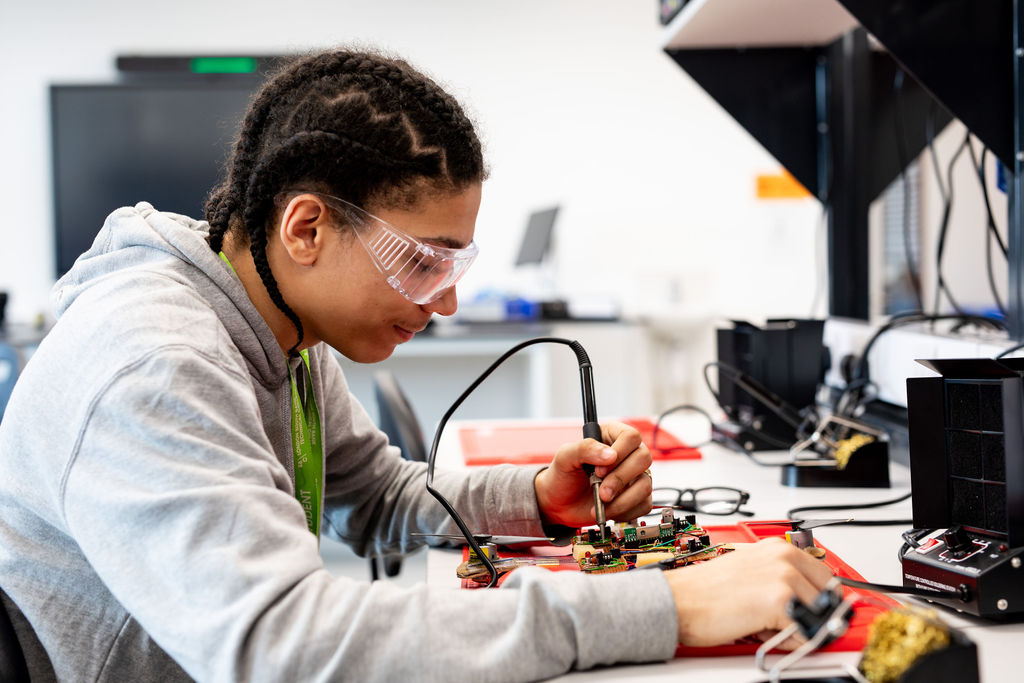We are excited to share our brand new Level 4 in Engineering. It will be delivered at London South Bank Technical College (LSBTC) in buzzing Nine Elms in partnership with London South Bank University (LSBU) who will manage your application.
The world of engineering is dynamic, fast-paced, ever-evolving, and intrinsic to the productivity, efficiency, and advancement of every industry on the planet. That is why highly skilled, well-trained, and qualified Engineers and Technicians are constantly sought-after by employers around the globe.
This one-year Level 4 qualification in Engineering is an advanced, technical qualification co-developed with London South Bank University and employers, delivered in a supportive Technical College environment with contemporary state of the art facilities.
You will get to perform experiments with real-world applications, using industry-standard equipment, and be taught how to scientifically analyse your results. By the end of the course, you will be equipped with the analytical skills, knowledge and understanding necessary to progress your career or study in this area. You will also undertake industry related enrichment visits and experiences to enhance your learning experience.
This immersive and hands-on course will teach you a wide range of technical knowledge, tied to practical engineering skills, gained in research, self-study, directed study and workplace activities.
Through the study of core units you will develop the essential and fundamental knowledge, skills, and techniques that all engineers require -irrespective of future specialism- and by selecting a set of focussed study units, you will be able to build a body of specialist techniques to be successful in a range of careers in engineering, at the Technician or Engineer level.
Visits to local projects and workplaces are integrated within the course, and students will be able to access some of London South Bank University's specialist facilities and benefit from the expertise of the University lecturers via master classes and other activities, whilst studying in small groups in a supportive College environment.
Gaining this industry-led qualification not only provides you with a direct route to Higher Education, including direct entry to the second year of London South Bank University's Mechanical Engineering Bachelor of Engineering degree, but also equips you with the specialised scientific knowledge and skills needed to fast-track your career as an engineer.
This course requires a dual enrolment. After enrolling at South Bank Colleges you will be invited to enrol at London South Bank University. Students can benefit from access to shared facilities, including The Hub, a state-of-the-art library and study space, and the university’s modern gym and fitness facilities. This unique advantage combines the best of college-level support with the extensive resources of a university campus.
What experience and skills will you gain?
The course offers students a broad introduction to engineering at degree-level study via mandatory core units, while allowing for the acquisition of specialist skills and experience through specialist engineering units. Students will gain a wide range of sector knowledge tied to practical skills gained in evidence-based practice, personal research, self-study, directed study and workplace learning and experience.
You will study core units:
- Engineering Design
- Engineering Maths
- Engineering Science
- Mechanical Principles
- Fundamentals of Thermodynamics and Heat Engines
- Fluid Mechanics
- Managing a Professional Engineering Project
- Computer Aided Design (CAD) fand Manufacture
-
Campus
This course will be delivered at London South Bank Technical College - Nine elms
-
What do you need to apply?
The standard entry requirement for the Higher National Certificate is 64 UCAS points alongside a minimum of grade C/4 in GCSE or equivalent qualification in English and Maths.
For students who have recently been in education, the entry profile is likely to include one of the following:
-
A* to C grade and/or 9 to 4 in GCSE Maths (or equivalent).
-
A BTEC Level 3 qualification in Engineering
-
A GCE Advanced Level profile that demonstrates strong performance in a relevant subject or adequate performance in more than one GCE subject. This profile is likely to be supported by GCSE grades at A* to C and/or 9 to 4 (or equivalent)
-
Other related Level 3 qualifications
-
An Access to Higher Education Diploma awarded by an approved further education institution
-
Related work experience
- An international equivalent of the above.
We also encourage applications from non-traditional learners who lack formal academic qualifications. You will be assessed through an interview where your overall interest in the relevant specialist pathway as well as current academic skills will be judged.
We will set an appropriate piece of work that elicits both a written and a practical creative outcome. From this work we will consider and assess your academic potential and relevant experience and skills. For example, you may not be able to evidence an educational background relevant to a specific pathway but may possess and demonstrate excellent problem-solving skills and a wide cultural appreciation of creative media. A desire to change careers through training will also be taken into consideration.
Applicants may also be admitted with credit for prior certificated learning (APcL) or work/life experience or other uncertificated learning (APeL).
-
-
How will you be assessed?
Assessment is continuous throughout the course, with a combination of written assignments, practical tasks, design projects, presentations, and time-constraint assignments and exams.
The assessment is criterion-referenced, and all units will be individually graded as pass, merit or distinction.
Both oral and written feedback will be provided during your course to help improve and monitor performance.
-
Where can this course take you?
This course could lead to direct employment in a variety of engineering-related industries and roles, including Maintenance Engineer, Engineering Maintenance Technician, Production Engineer, Design Engineer, Project Engineering; or give you the opportunity to progress straight to Higher Education.
After successfully passing the Level 4 Higher National Certificate in Engineering (General Engineering), you may wish to consider progressing to Higher Education, including direct entry to the second year of London South Bank University's Mechanical Engineering Bachelor of Engineering degree. You may also consider another of London South Bank University's degree courses (additional qualifications may be required).




